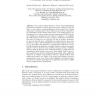Free Online Productivity Tools
i2Speak
i2Symbol
i2OCR
iTex2Img
iWeb2Print
iWeb2Shot
i2Type
iPdf2Split
iPdf2Merge
i2Bopomofo
i2Arabic
i2Style
i2Image
i2PDF
iLatex2Rtf
Sci2ools
108
click to vote
EMO
2001
Springer
2001
Springer
Reducing Local Optima in Single-Objective Problems by Multi-objectivization
One common characterization of how simple hill-climbing optimization methods can fail is that they become trapped in local optima - a state where no small modi cation of the current best solution will produce a solution that is better. This measure of `better' depends on the performance of the solution with respect to the single objective being optimized. In contrast, multi-objective optimization (MOO) involves the simultaneous optimization of a number of objectives. Accordingly, the multi-objective notion of `better' permits consideration of solutions that may be superior in one objective but not in another. Intuitively, we may say that this gives a hill-climber in multi-objective space more freedom to explore and less likelihood of becoming trapped. In this paper, we investigate this intuition by comparing the performance of simple hill-climber-style algorithms on single-objective problems and multiobjective versions of those same problems. Using an abstract buildingblock p...
EMO 2001 | Local Optima | Multi-objective Optimization | Optimization | Simple Hill-climbing Optimization |
Related Content
| Added | 28 Jul 2010 |
| Updated | 28 Jul 2010 |
| Type | Conference |
| Year | 2001 |
| Where | EMO |
| Authors | Joshua D. Knowles, Richard A. Watson, David Corne |
Comments (0)

